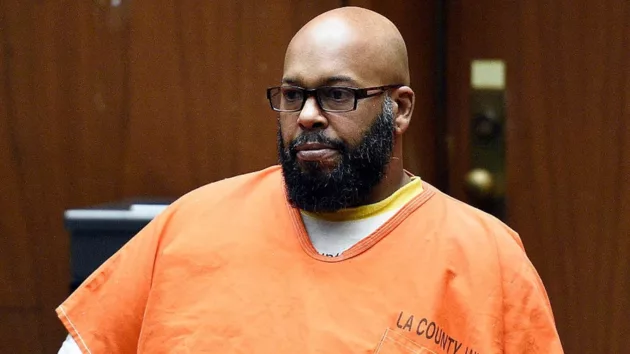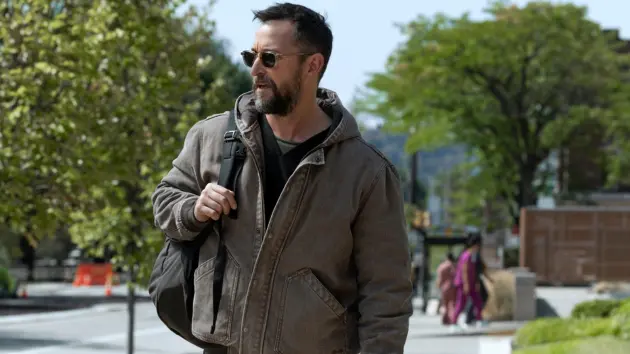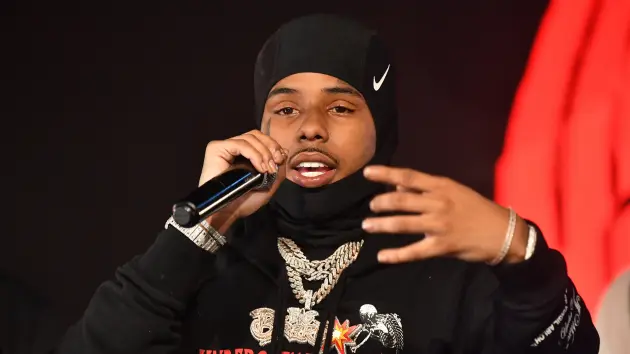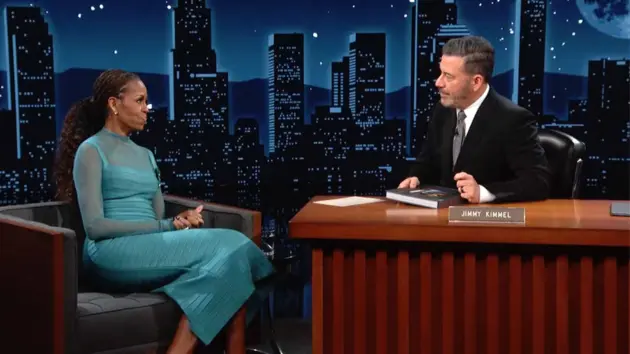
Through the course of three weeks of testimony in the trial of Sean “Diddy” Combs, one man has loomed large even as he remains locked up in a prison more than 2,500 miles away. That man is Marion “Suge” Knight, the rap impresario who was viewed by many as Combs’ chief competitor at the peak of Combs’ prominence atop the hip-hop world.
During hours of conversation with ABC News over the weekend, Knight offered his reactions to the trial that has grabbed headlines and offered an often-disturbing portrait of the private life of a pop-culture icon and fashion tastemaker who could end up being sentenced to serve the rest of his life in federal prison, if convicted. Combs has pleaded not guilty and denied all wrongdoing.
Knight’s name has been mentioned in the Combs trial at least 50 times so far, with some of those references connected to the notorious Combs-Knight rivalry and others simply acknowledging that Knight once led Combs’ fierce competitor, Death Row Records. Their names are synonymous with the explosion of hip-hop, and the bad blood between the two moguls and their record labels.
Knight is currently serving a 28-year sentence for voluntary manslaughter stemming from a 2015 fatal hit-and-run not connected to Combs’ case, to which he pleaded no contest in 2018. The famed founder of Death Row Records had an extensive criminal rap sheet that added time to his current sentence because it triggered California’s three strikes law. According to law enforcement, Knight has longstanding ties to LA’s infamous Bloods street gang.
Speaking for himself in a series of phone interviews Saturday, Knight described what he saw as a toxic culture of abuse in some parts of the hip-hop industry that certainly did not start with Combs.
On the phone, Knight said that, if Combs is the only one held accountable for alleged violence and abuse inside the world of rap, it won’t break the cycle.
“If you’re going to make Puffy answer, make everyone answer,” Knight said, referring to those who benefited from a system of trading sexual favors for advancement, or enabled the kind of behavior of which Combs is accused.
“Change the theme of the culture of the problems in hip-hop,” Knight said, repeatedly referring to Combs by his earlier street names “Puff” and “Puffy.”
“I think it’d be a great thing to let Puffy tell his truth. Tell the real truth, and bring everybody accountable,” Knight said.
Long before federal authorities charged Combs for alleged sex-trafficking and racketeering in connection with a lifestyle of allegedly forced sex sessions called “freak-offs,” Knight claimed there had long been rumors about Combs’ sex life back to the 1990s and 2000s.
“Everybody knew that,” Knight said, but that “Puffy didn’t just pop in the industry and say, ‘Hey, I want to have sex with everybody,’” Knight said. “I mean, we don’t have enough time to name all the names.”
Combs’ alleged use of fear and force to get what he wanted has been a frequent theme in his criminal case, far beyond sexual favors. The prosecution of Combs hinges on the core accusation that Combs used coercion and force to get what he wanted. To make that point, prosecutors presented Combs’ former assistant Capricorn Clark, who said she returned to work for Combs after leaving his employment because Combs allegedly made it impossible for her to work elsewhere in the music industry.
“He held all the power as it related to me,” Clark testified through sobs.
Clark told jurors she had worked for Knight before Combs — a connection that, she claimed, did not sit well with Combs.
“He told me he didn’t know that I had anything to do with Suge Knight and, if anything happened, he would have to kill me,” Clark testified.
On cross-examination, Combs’ defense attorney Marc Agnifilo attempted to undermine Clark’s overall portrayal of Combs — and why she would want to continue working for a man who had allegedly threatened her.
“I wanted my life back, sir,” Clark said.
“You want to work with him again,” Agnifilo said. “I wanted to work in the music industry,” Clark replied.
In his comments to ABC News, Knight lamented how Clark had allegedly been treated.
“I feel bad for Capricorn,” Knight said, describing “a young woman who want to work hard and become successful in the world.”
“She did great things for Puffy. Anything he needed, she got it. Anything he wanted, if she didn’t have it, she made it happen,” Knight said. “A lot of people might say, well, Capricorn could have did anything else she wanted to do. She did try. If you go get a job at Universal and Puffy makes a phone call, you’re not getting that job. If you go get a job at a counter agency or in the movie business and Puff make that call, your career is over.”
Knight recalled Clark telling him she had been warned by another records executive not to “tell on Puffy,” and that she was allegedly paid for her silence, he said.
On the witness stand, Clark recalled one meeting where, she claimed, she was given such a warning.
“It wasn’t about job opportunities. They were there to tell me to leave Puff alone and that this wasn’t going to end well for me,” Clark testified. “The outcome of that meeting was that — well, no job, but it was a warning.”
In response to that testimony, Knight said, “They put that woman in a situation where she didn’t have no choice but try to be cool with these people if she’s gonna be in the industry.”
Knight said Combs did not invent the hardball tactics he allegedly employed.
“Don’t get me wrong, he (Combs) did terrible things, but he just didn’t come up with those stuff and those ideas on his own,” Knight said. “I don’t feel that they should take Puffy and lock him up and throw away the key. I think he can do so much good right now, him telling the truth about the industry,” Knight said. “When you can pick and choose who to put on the fire pit, it’s not fair.”
Combs should tell “the whole truth, nothing but the truth so help him God. That way, everybody would — history won’t keep repeating itself,” Knight said. “It’s a long list of people in the industry that’s unhappy because of the things they were being put through. And that’s the sad part about it.”
Knight said he sympathizes with Combs’ position.
“I feel that people in Puffy’s life, going on his journey growing up, they failed him,” Knight said.
“Do I think he made some mistakes? I think he repeats what he’s seen. He repeats what he learnt,” Knight said.
“First thing I would tell Puffy is this — I’m not going through what he’s going through for his freak-offs. But I’ve been there sitting in those cells. And I know he feels that he don’t have a friend in the world,” Knight said. Of all those once in his glamorous orbit, “none have been to court. None of them have been a help. So I’m quite sure he’s in a lonely place right now,” Knight said.
Combs’ family has remained by his side, some even sitting in on trial proceedings; Knight noted that cannot be easy for his kids especially.
“If there’s a situation where he can do some time, but not a lot of time, go knock it out. Don’t keep torturing yourself,” Knight said. “Once he get where he going, to a real prison, he’ll be able to, you know, have a step closer to freedom.”
Knight suggested that, perhaps, Combs should plead out. (Knight himself pleaded no contest to voluntary manslaughter and was sentenced to prison in 2018.) Combs declined a plea deal on the eve of trial in May.
“I think they should work out a deal with Puffy,” Knight said.
Though Combs and Knight are usually portrayed by the media and law enforcement as having been rivals, Knight said he saw it differently.
“I wouldn’t quite say we was rivals, because to say we rivals that means we had to be really really bad enemies,” Knight said.
“I do feel that he cared about the music industry. I think he do love the industry, and he did a great job with his artists, I do an incredible job with my artists,” Knight said, detailing a long history of competition as hip-hop went from being a street sound to a billion-dollar business. “I say it all the time, Puffy is known for making hit singles, like one song to go crazy. I’m known for making hit albums. Puffy can take an artist and make great music with them. I can take an artist and make them a superstar.”
The alleged grudge between Combs and Knight was a focus of early testimony in Combs’ trial. Combs’ former personal assistant David James said that, one night in 2008, he spotted Knight and his entourage eating at Mel’s Drive-in diner in Hollywood, and said Combs, upon hearing that, wanted to go confront Knight and the rival group.
Knight responded to that testimony this way: “If there’s anything suggesting that I was doing anything illegal, I’m gonna say, definitely not,” Knight said chuckling. “I’m’a put it to you like this — I’m quite sure I remember some of that.”
“Anybody that know me — from 2 o’clock in the morning or 3 o’clock in the morning, to almost 6 o’clock in the morning, I’m always at Mel’s with six or seven [pretty women] enjoying myself. Until I finally was in a relationship with someone,” Knight said. “I’m a real West Coast man, and I have different stuff that I like to eat, but Mel’s was one of my places, because Mel’s was open 24 hours, you know?”
If Combs did insist on returning to the diner to confront Knight, as James testified, Knight said perhaps it’s because “he’s got to show power.”
Of the competition between the two record-label bosses, Knight said he was told Combs would listen to Death Row music.
“I was surprised about that,” Knight said, making a reference to the late Death Row rap star Tupac Shakur. “He’d put on Death Row music, he’d put on Tupac, they’d go to the boat in the marina, the yacht, whatever it was, and get the Death Row music going again.”
“I hope he wasn’t jealous of me, ’cause if he was jealous of me, that means he was liking me too much, loving me too much,” Knight said.
“I don’t put myself in his head — or no one else’s head — because the man is on trial fighting for his life,” Knight said.
ABC News’ Peter Charalambous and Kaitlyn Morris contributed to this report.
Copyright © 2025, ABC Audio. All rights reserved.





